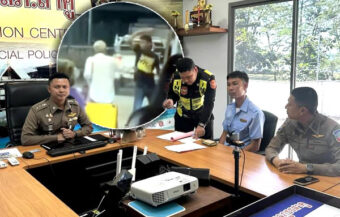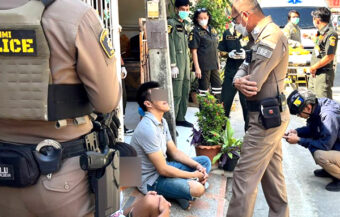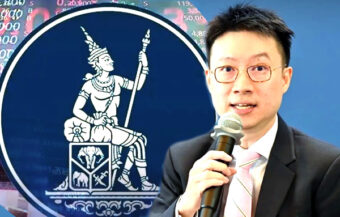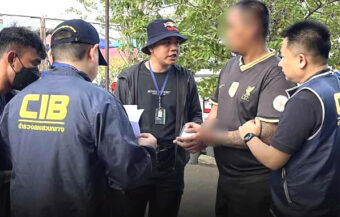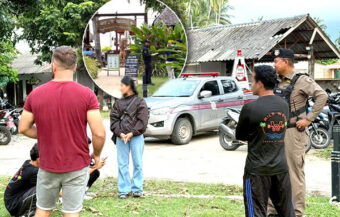The drive to legalise pot or marijuana pursued by the Bhumjaithai Party may, in time, prove popular with Thai people as a source of income or potential health benefits but for now, it has left law enforcement agencies and the police facing a minefield and a new challenge to determine what is legal and what is illegal even after June 8th next when the ministerial order to remove cannabis as a schedule 5 listed narcotic has full legal effect. For now, however, it does not appear to be such a big vote winner with the electorate as the country faces the rising prospect of a General Election.
A shock opinion poll on Sunday shows that Bhumjaithai Party and Deputy Prime Minister Anutin Charnvirakul lagging far behind other political contenders despite the party’s mission to legalise pot in Thailand which is causing legal confusion for law enforcement agencies across the country as Thai officials try to balance the finer aspects of laws and regulations which, so far, has resulted in a grey area over what exactly is legal and not.
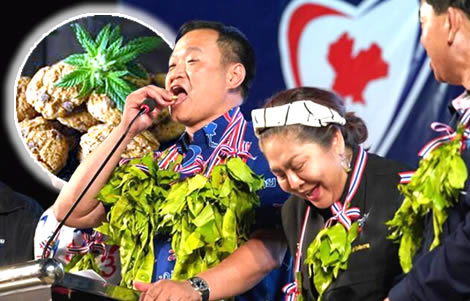
On Sunday, in a National Institute of Development Administration (NIDA) opinion poll published in the Bangkok Post newspaper, the Bhumjaithai Party, Thailand’s populist and nationalist political grouping which took 10.33% of the vote in the 2019 General Election and 51 seats in parliament, only managed to register 1.88% with the two main opposition parties, the Pheu Thai Party and Move Forward Party, dominating the field with over 42%.
It will have been bitterly disappointing news for Deputy Prime Minister Anutin who currently holds the fate of the beleaguered coalition government in his hands and has predicted that his party is ready to fight the next General Election highlighting the party’s record in support of the government of Prime Minister Prayut Chan ocha and also, significantly, its populist commitment to legalising cannabis or marijuana which was removed by Minister Anutin from the schedule of prohibited narcotics at the end of January.
Deputy Prime Minister Anutin last week came to the rescue of two women arrested in Khon Kaen for possession of cannabis plants for personal use
Last week, Mr Anutin reportedly came to the rescue of two women who were arrested by police in Khon Kaen after they were found each to own a cannabis or marijuana plant.
In the aftermath of the arrests of the women on Sunday 20th March, the local Provincial Police commander’s office issued guidance to all officers within his force to exercise tact and caution at this time concerning the implementation of the law concerning cannabis.
The current legal grey area concerning possession and use of the substance followed a ministerial order issued by Mr Anutin in late January which saw cannabis or marijuana removed as a schedule 5 listed narcotic.
However, the regulation, strictly speaking, only comes into effect on June 8th, 120 days after it was published in the Royal Gazette.
Bhumjaithai Party only had 1.88% support
The Deputy Prime Minister, whose Bhumjaithai Party, according to a National Institute of Development Administration (NIDA) opinion poll published on Sunday, now only commands 1.88% support among the public, well behind the two main opposition parties who had over 42% support.
The poll revealed the party’s leader placed well behind the leader of the Democrat Party, Jurin Laksanawisit on 2.5% among a band of ten party leaders and former leaders who amassed only 5.59% between them.
The party’s poor showing in the poll leaves it propping up the tables.
This has been predicted by political pundits who believe that this government in which the Bhumjaithai Party and its leader have had significant profiles, is deeply unpopular not least because of its handling of the COVID-19 crisis and last year’s debacle concerning COVID-19 vaccines.
New Shinawatra may lead the next quest for power as Pheu Thai Party aims for 14 million members
Government is in its death throes as divisions multiply with July likely to be a decisive month for the country
In the months leading up to a General Election, the Bhumjaithai Party has, reportedly, increasingly been counting on the party’s mission to legalise pot as a vote catcher.
Arrests of normal people for possession of medicinal cannabis plants a form of bullying said the minister in a statement with regulation changes pending
At the time of the intervention last week, Deputy Prime Minister Anutin issued a strongly worded statement on the issue in which he suggested that the arrest of normal people growing cannabis plants was akin to a form of bullying.
‘We understand that with the boundary between the old law and the new law, there may be confusion among law enforcement officials and the public. For the benefit of the people and in accordance with the intent of the law, we have made representations to the National Police Office to help provide guidance to police officers. The police must, during this time, prevent the arrest of villagers which may be seen as bullying and bullying the people,’ the minister said.
His comments came after the government’s legal expert, Deputy Prime Minister Wissanu Krea-ngam, at the end of January, called on the public not to overtly be seen making use of the new legal dispensation at this time until the new ministerial regulations came fully into force.
Government legal adviser, in January, promised a new law to impose regulation and control dealing in cannabis to uphold Thailand’s treaty obligations
At the same time, Mr Wissanu spoke of a new law to reimpose controls over the use of cannabis or marijuana so that Thailand’s international treaty obligations are upheld.
This includes restrictions on the sale and dealing of cannabis or marijuana and a legal framework to ensure that any cannabis plant extract cannot have a THC value over 0.2%, which is quite low and well below the strength of illegal cannabis resin on the market.
This is a dark brown sticky substance found on the trichomes of a cannabis plant.
It is the most valuable component of the plant from the point of view of end-users for recreational purposes.
As part of the implementation, it is understood that Thailand’s Food and Drug Administration is examining the matter to clarify and streamline the situation.
Meaning of the THC limitation in terms of legal enforcement after June 8th and pending legislation
There is some confusion already over the meaning and intent of this law which is making its way through parliament dealing with the proposed THC or tetrahydrocannabinol limitation.
THC is the psychoactive ingredient in cannabis that users seek to achieve a high in terms of recreational use.
Normally this was set at a minimum of 0.3% to 0.4% for illegal users of the drug as narcotic with some special cultivators achieving a premium high with a THC as high as 25%.
Strength of tetrahydrocannabinol, the active ingredient in cannabis will be set at an ultra low level
The confusion over the issue relates to the use of cannabinol which has been used for medical purposes for some time and is thought of as a non-psychoactive cannabinoid while cannabis resin is more psychoactive and has been used, up to now, illegally as a drug to get high.
Legal cultivation of cannabis or marijuana for personal medicinal use appears to be the aim of the mission being pursued by the Bhumjaithai Party
The new law, which is being pushed by Minister Anutin and the Bhumjaithai Party will, however, make the widespread cultivation and sale of cannabis for medical health purposes legal once those involved have sought and obtained a commercial licence from local authorities to do so.
There are definite signs that the move is somewhat popular among the Thai public with reports that many villagers and small farmers have begun dabbling in the crop based on reports of the new law and the vision of the Bhumjaithai Party.
There is no doubt that there has been a growing demand for decades in Thailand as in other countries for more access to cannabis products that have proven medicinal quantities but it has, up to now, been a minority of the population that has used the substance.
Generational shift since the 60s in Thailand as elsewhere but marijuana remains a target of US and UN law enforcement while being a Chinese tradition
There has also been a generational shift since the 1960s when the more widespread use of marijuana was repressed as part of the war on drugs that originated in the United States.
Indeed, many campaigners against the criminalisation of the drug in Thailand have pointed to high incarceration rates in the kingdom as another result of this policy which they have linked to the influence in Thailand of US and UN anti-drug trafficking authorities who work closely with Thai law enforcement agencies including the Royal Thai Police.
Although the use of cannabis is also illegal in China, the communist country has a long-standing tradition of using the drug as a health regenerator with Chinese farmers growing the crop for the production of fabrics, medicinal products and recreational use while Chinese firms, up to 2017, held 309 out of 606 worldwide patents relating to the production of cannabis-related products.
YouGov poll conducted in February showed teenagers and younger adults less interested in cannabis products than Millennial or Generation X adults
This change in attitude can be seen in the eye-opening results of a YouGov Poll taken in Thailand on the 28th of February last with 2,044 participants.
Significantly, the survey showed that attitudes toward cannabis among younger people in Thailand are more akin to older people surveyed with only 47% of Generation Z adults or teenagers reported as having used the substance in the last year compared to 55% of millennials and 41% of Generation X adults.
Generation Z adults were born from 1997 to 2009 whereas millennials were born from 1981 to 1996. Generation X adults were born from 1965 to 1980 while baby boomers, the older generation, were born from 1946 to 1964.
In the YouGov survey, only 28% of baby boomers had used cannabis or marijuana in the last year.
The same trend was in evidence when it came to a willingness to experiment with possible new cannabis products which may emerge as a result of the new regime.
Marijuana is something pursued by men in Thailand
A massive 65% of Generation X adults were open to the idea followed by 64% of millennials. Even 60% of baby boomers were more open-minded based on the new legal dispensation.
However, Generation Z was the most reluctant of the age groupings with only 55% having an open mind to the use of cannabis-related products.
Across all age groups, 31% remained disinterested or opposed to the use of cannabis linked products.
The survey showed that men in Thailand are more interested in cannabis with 26% of men expressing an interest in consuming the substance itself compared to only 15% of women.
Key benefits of the natural drug appear to be its ability to reduce stress, anxiety and sleeping problems
For those who are using the substance and interested in experimenting more in-depth with it once the potential new regime is confirmed, the key benefit which emerged from the survey was the drug’s reported ability to offer relaxation and as an antidote to anxiety.
This was suggested by 50% of those inclined to use cannabis or cannabis-related products. 46% mentioned using it to treat sleep disturbance with a similar number citing its ability to induce an improved mood.
31% of those who favour marijuana were looking forward to using it to combat tiredness with 31% believing it would improve appetite.
Fears of brain damage and behavioural problems as more evidence points towards harmful effects such as brain abnormalities caused by regular use of pot
Those opposed to cannabis feared its addictive capabilities with 36% expressing concern at this while 21% feared a loss of behavioural control with 18% fearing brain damage or loss of memory.
There is a growing body of medical evidence to support these fears and claims.
In 2014, a study conducted by Northwestern Medicine and the Massachusetts General Hospital, in association with Harvard Medical School, found that the recreational use of cannabis resulted in brain abnormalities in two regions of the brain among younger users.
The findings showed that the rate of change was directly related to the number of cannabis or marijuana joints consumed each week meaning changes in what researchers referred to as the shape, density and volume of such abnormalities.
‘This study raises a strong challenge to the idea that casual marijuana use isn’t associated with bad consequences,’ said one of the senior authors of the study Hans Breiter, M.D, a professor of psychiatry and behavioural sciences at Northwestern University’s Feinberg School of Medicine and a psychiatrist at Northwestern Memorial Hospital in Chicago, Illinois.
‘Some of these people only used marijuana to get high once or twice a week,’ Breiter said at the time. ‘People think a little recreational use shouldn’t cause a problem if someone is doing OK with work or school. Our data directly says this is not the case.’
Bad taste or odour from pot is a turn-off
At the same time, 15% of those in Thailand disinclined to use cannabis or marijuana in any event also cited its unpleasant odour or taste as a consideration with the same amount fearing an increased and possible erratic heart rate from using the now delisted narcotic.
Last week, in response to the arrest of the two women, the police chief of Provincial Police Region 4, Police Lieutenant General Yanyong Wet-osot, issued an order restraining his force from strict enforcement of the law at this time.
Police chief in Region 4 issues guidance to officers to be circumspect at this time in prosecuting cases linked with cannabis plants following arrests
A spokesman for the police boss, Police Major General Phaisan Luesombun said this: ‘Even if they are found to lack permission to grow any cannabis plant, a suspect should instead be given a warning and told why it is illegal for them to possess the plant.’
The two women at the centre of the controversy last week, 72-year-old Nang Mahasena and 48-year-old Bunseng Singhoen, were arrested and later released from custody on bail.
They were visited afterwards at their homes in Khon Kaen by the chief of Ubonrat Police Station, Police Colonel Direkrit Panrueansaen who personally briefed them on the current legal situation.
Following the controversy over the arrest of the women, the Bhumjaithai Party leader said that his party would provide lawyers for any villager or normal person arrested in a similar situation except for those detained by police concerned with large drug dealing offences who may be still illegally trafficking cannabis in Thailand.
Bhumjaithai Party leader Anutin calls on people after June 8th to exercise caution and responsibility relating to the new dispensation as concerns remain
At the same time, he called on the public to exercise caution and responsibility with regard to the new legal regime after it comes into effect officially on June 8th next.
According to reports, there continue to be sceptics within key government agencies responsible for combating drug proliferation in Thailand both as to how the new regulatory regime will be operated and how Thailand can honour its international commitments concerning three treaties or conventions signed by the kingdom between 1961 and 1988.
3 significant international conventions were signed by Thailand between 1961 and 1988 on narcotics control including cannabis but there is wiggle room
It does appear, however, that there will be legal scope for people in Thailand to grow and cultivate the plant and crop itself for personal use and to deal commercially in the substance once a licence has been obtained but the specifics of such arrangement have yet to be made clear.
The situation can also easily be reversed by ministerial order or clarification by a new government.
New cannabis industry emerging but, in January, police arrested the operators of a cannabis cookie online store in Bangkok, a front for marijuana sales
In the meantime, there is now a burgeoning industry in cannabis extracts developing in Thailand all in a properly regulated and, apparently, legal industry although there is ongoing confusion, particularly for small-time operators and those seeking to exploit the new dispensation to sell cannabis resin directly to end-users.
In late January, at the same time as the minister introduced his regulatory orders and measures aimed at removing cannabis as a schedule 5 narcotic, police in Bangkok swooped on three people operating a business manufacturing and selling cannabis cookies through a LINE group with 100 customers called the ‘Hippy Cookie’.
An undercover policeman joined the group posing as a buyer. He was able to buy 5 grams of cannabis for ฿3,500.
A challenge facing law enforcement
The people involved in what police declared to be an illegal racket were left facing serious criminal charges of illegally processing and manufacturing products with a high degree of THC or tetrahydrocannabinol which is still illegal.
The situation underlines the fears and anxieties of many experienced officials who behind the scenes suggest that there are concerns that the new regime being developed will inevitably lead to confusion and make the job of enforcing Thailand’s drug laws more difficult.
Join the Thai News forum, follow Thai Examiner on Facebook here
Receive all our stories as they come out on Telegram here
Follow Thai Examiner here
Further reading:
New Shinawatra may lead the next quest for power as Pheu Thai Party aims for 14 million members
Bad news for PM and Palang Pracharat in Bangkok on Sunday as resurgent Pheu Thai Party wins big
By-election polls amid a weak economy and rising food prices may mean a 2023 General Election
Wife of deposed Bangkok MP Sira campaigns for his job based on his 3 years of service to people
Move against Pheu Thai, the kingdom’s biggest political party, over it’s alleged links to Thaksin
Fears grow that Ferrari Jo will evade justice as local monk offers him support as a ‘peacekeeper’
Police probe high-end Thong Lor club prostitution links and may call in the owners for questioning
Bangkok MP will call to account cabinet ministers who he claims were at a Thong Lor nightlife spot
Government MP and committee Chairman to have his status reviewed by the Constitutional Court
Minister has 15 days as the Constitutional Court accepts a petition filed by the house speaker
Boss Vorayuth case key witness dies riding his motorbike early on Thursday morning in Chiang Mai
One of the biggest drug dealers in the South flees home as Thai police and army move against him
Thai man burns down his family home: Thailand’s drugs problem is still a very real threat to society
UK man arrested on drugs charges by CSD police in Pattaya claims ex Thai wife set him up
UK drug dealers living it up in Thailand to be deported back to the UK after arrests in Pattaya
Italian living with Thai wife on Koh Phangan arrested for dealing after drugs found in the post
UK drug dealers living it up in Thailand to be deported back to the UK after arrests in Pattaya
Kiwi taken into custody on drug charges in Chiang Mai after police raided his bar and restaurant



